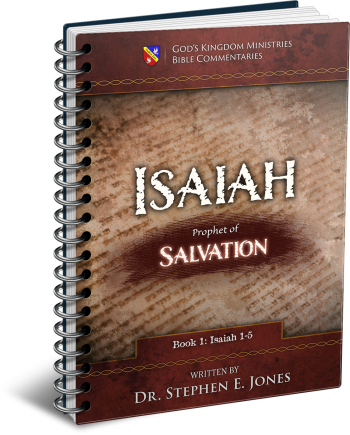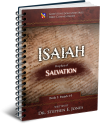Latest Posts
View the latest posts in an easy-to-read list format, with filtering options.

Isaiah is the prophet of Salvation. He is also known as the truly "Universalist" prophet, by which is meant that He makes it clear that salvation is extended equally to all nations and not just to Israel. He lived to see the fall of Israel and the deportation of the Israelites to Assyria, and he prophesied of their "return" to God (through repentance). He is truly a "major prophet" whose prophecies greatly influenced the Apostle Paul in the New Testament.
Category - Bible Commentaries

Isaiah 1:3 says,
3 “An ox knows its owner, and a donkey its master’s manger, but Israel does not know, My people do not understand.”
God called Israel “My firstborn son,” but Israel soon ceased to recognize his Father. Israel had become senile before his time. The problem was that Israel had refused to recognize that they were “one nation under God.” Having displaced God from His throne, they set up fleshly men as the highest authority in the land and were ruled by the traditions of men.
Isaiah 1:4 gives us the prophet’s lamentation,
4 Alas, sinful nation, people weighed down with iniquity, offspring of evildoers, sons who act corruptly! They have abandoned the Lord, they have despised the Holy One of Israel, they have turned away from Him.
Israel was turned from being sons of God to “offspring of evildoers.” Natural sons are unable to change fathers, but spiritual sons may easily change fathers, because the change is legal, not biological. The same law by which these sons of God were turned into sons of evildoers has the power to turn us back into the sons of God.
Isaiah 1:5, 6 says,
5 Where will you be stricken again, as you continue in your rebellion? The whole head is sick, and the whole heart is faint, 6 from the sole of the foot even to the head there is nothing sound in it, only bruises, welts, and raw wounds, not pressed out or bandaged, nor softened with oil.
The prophet says that God had disciplined them so much already that His son was full of bruises, welts, and raw wounds from head to toe, yet no amount of discipline could turn their hearts. God had brought Israel into six distinct captivities prior to the time of Israel’s monarchy, and in Isaiah’s day the Assyrians were soon coming to put them into a lengthy iron-yoke captivity.
Not much had changed since the days of Moses, when the people wanted to stone him. Since all previous disciplinary action had not produced repentance, except in the remnant, the time was drawing near for the law of the stubborn son to be enforced. Deut. 21:18-21 says,
18 If any man has a stubborn and rebellious son who will not obey his father or his mother, and when they chastise him, he will not even listen to them, 19 then his father and mother shall seize him and bring him out to the elders of the city at the gateway of his hometown. 20 They shall say to the elders of his city, “this son of ours is stubborn and rebellious, he will not obey us, he is a glutton and a drunkard.” 21 Then all the men of his city shall stone him to death; so you shall remove the evil from your midst, and all Israel will hear of it and fear.
This is one of the laws by which God put the nation of Israel to death. National death does not mean every individual was killed, but rather that the national entity had been destroyed. In other words, the nation of Israel no longer existed. The people were deported to Assyria, where one large group was settled in the land of Gamir and was known as Gamira, a name derived from Gomer, the wife of Hosea who was a type of Israel. Gomer, in turn, was the old spelling of Omri, the king of Israel whose son was Ahab.
Two centuries later, Assyria fell to Babylon, and many of these Gamira (also called Khumri, i.e., the Celts) immigrated into Europe. As time passed, they formed many different nations, but God did not allow any of them to take the name Israel. Hence, Israel as a nation was dead, having been stoned for persistently stubborn rebellion.
The modern state called Israel is a Jewish state, not an Israelite nation. God allowed them to take the name Israel for other reasons which I covered thoroughly in my book, The Struggle for the Birthright. The modern Israeli state is not what most Christians think it is, yet it is certainly in the divine plan. By understanding the divine law, we may see its purpose clearly.
Isaiah 1:8, 9 says,
8 The daughter of Zion is left like a shelter in a vineyard, like a watchman’s hut in a cucumber field, like a besieged city. 9 Unless the Lord of hosts had left us a few survivors [sariyd], we would be like Sodom, we would be like Gomorrah.
Isaiah paints a scene of isolation like a tiny fortress in the midst of a siege. In other words, only a few people are left—in this case, a righteous remnant in a nation full of iniquity. The prophet calls them “survivors,” using the word sariyd. This is similar to she’ar, “remnant,” except that sariyd pictures a few refugees who have survived a massacre.
The prophet then compares Israel to Sodom and Gomorrah, not only in moral character but also insofar as divine judgment is concerned. He says that the only reason Israel was not treated like Sodom and Gomorrah (i.e., destroyed completely, never to arise again) is because “the Lord had left us a few survivors.”
In other words, the presence of the remnant stayed the hand of God, whereas in the case of Sodom and Gomorrah, God removed Lot and his family from the city so that He could destroy it. The angel told Lot in Gen. 19:20-24,
20 Now behold this town is near enough to flee to, and it is small. Please, let me escape there (is it not small?) that my life may be saved… 22 Hurry, escape there, for I cannot do anything until you arrive there. Therefore the name of the town was called Zoar [“little, small, insignificant”]. 23 The sun had risen over the earth when Lot came to Zoar. 24 Then the Lord rained on Sodom and Gomorrah brimstone and fire from the Lord out of heaven.
Lot was the “remnant” in his day. His presence preserved Sodom and Gomorrah for as long as he remained there. But the day came when God removed him so that judgment could come upon these wicked cities.
In the case of Israel, the nation was just as wicked as Sodom and Gomorrah. It too was being preserved as long as there was a righteous remnant in the land. As we will see later, Isaiah had a son named She-ar jashub, “the remnant will return.”
It appears that Isaiah’s son served as a prophetic type of the remnant being removed from Israel in order to allow the Assyrians to destroy the nation. That is why Isaiah and his sons were in Jerusalem, the capital of Judah. Yet when Isaiah wrote the first chapter of his book, it appears that he was living in Israel and felt isolated in a sea of wickedness. For this reason, he would write as if the remnant was still present in Israel, preventing the nation’s final destruction.
The implication is that once Isaiah and his children moved out of Israel into Judah, the signal was given to the Assyrians to destroy the nation.